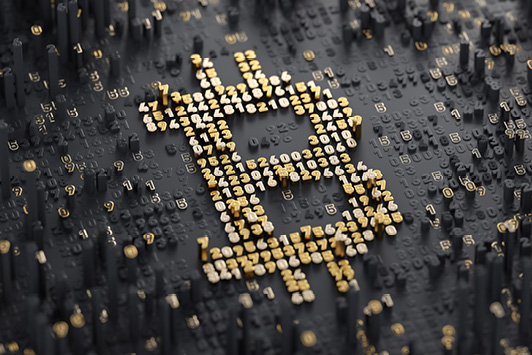
Picture this: You’re helping a customer who is very close to making a purchase on a good-quality, high-value diamond. The topic of payment comes up, and instead of using Apple Pay or pulling out a recognizable credit card, this client asks if you’re willing to accept Bitcoin. You pause — you’re not sure how to answer. Nearly a decade after the cryptocurrency first appeared from the depths of the internet, the very idea of it still feels risky and abstract, like an underground point system used only by criminals and hackers.
But while Bitcoin has certainly earned its dubious reputation — a Russian crime boss was recently discovered to have laundered over $4 billion using Bitcoin accounts — it’s also becoming increasingly mainstream. Major companies like PayPal, Microsoft and Overstock now accept it. IBM has wholeheartedly embraced blockchain, the sophisticated ledger technology that tracks each bitcoin’s movements. And slowly but surely, retailers are coming to regard Bitcoin as a legitimate form of payment. This leaves jewelers and other diamond sellers in a position to answer an almost unprecedented question: Is it time to embrace a new form of money?
Bitcoin was conceived as an alternative digital currency, insulated from the tides of global instability and government control. There is no such thing as a physical bitcoin; it’s simply a unit of measure that represents a given sum. When the system went live in January 2009, an individual bitcoin, or BTC, wasn’t worth much. Today, things have changed. On October 12, 2017, the price of one bitcoin surged past $5,000, an all-time high. This means that what started out as an offbeat cyber experiment has become a real financial system; there have even been rumors that old-school power player Goldman Sachs is planning to open a Bitcoin trading desk soon, according to a recent Wall Street Journal report.
On the other hand, skeptics argue that we’re in the throes of a Bitcoin bubble. What makes the currency so appealing to some is precisely what makes it seem dangerous to others. Proponents of Bitcoin love that the system is decentralized and therefore protected against the kinds of global events that caused the 2008 financial crisis. In that way, bitcoins are not altogether different from diamonds or other precious gemstones — they’re all alternative, portable means of wealth for investors who are skeptical of the long-term value of traditional purchases, like real estate and stocks. However, critics of Bitcoin argue that government regulation, at least in the US, is inevitable, and once that happens, the cryptocurrency’s value will plummet.
Still, that hasn’t stopped international celebrity jeweler Samer Halimeh from making the decision to honor Bitcoin as of this past September after noticing a rapid increase in requests from his clients to do so. In his view, the marriage of Bitcoin and luxury retail is an obvious one.
“Over the last couple of years, [Bitcoin] has gradually gone upmarket with portals buying and selling previously owned but high-quality goods [like] Ferrari cars, Mercedes-Benz sports cars, Rolex watches and jewelry,” he says. “What is now happening is, retailers like ourselves are directly accepting bitcoins for brand new luxury goods.”
So what does it mean to trade bitcoins for diamonds? (“Trade” is probably the most appropriate word, considering that for tax purposes, the IRS currently regards virtual currency as property, not money.) At best, it’s a quick, anonymous way to pay, with fewer potential glitches than credit cards and very low fees. In theory, it’s safer to accept Bitcoin than cash, as the blockchain protects against issues like counterfeiting. But at worst, the diamond seller who trades jewels for bitcoins is putting undue faith in a volatile, unregulated currency with no proven track record. It’s exchanging one unpegged commodity — a diamond — for another one, but in the case of a bitcoin, it’s neither a time-tested system nor a shiny physical product.
Nonetheless, Bitcoin’s success shows there’s a worldwide appetite for alternative capital, especially among people who don’t trust traditional financial institutions anymore. Perhaps that’s why the Israel Diamond Exchange (IDE) has partnered with the startup CARATS.IO to create an official diamond-backed digital currency called CDC. While there’s a long history of the stones being used in lieu of cash, this experiment will formalize the notion of diamonds-as-money. As CARATS.IO has revealed, it wants to create a digital currency that’s potentially less volatile than Bitcoin, because it will be linked to an existing commodity.
Is this good news for the diamond world? The Israeli bourse thinks so, hoping the collaboration will increase trades. That said, it’s another step toward standardizing the price of diamonds, which — at least in the past — the industry has resisted. Overall, while it’s risky for a luxury retailer or diamond trader to take a few rare payments in Bitcoin, it’s unlikely to be disastrous. But one might want to think twice before altogether abandoning those other, more reliable currencies; they have their faults, but at least those faults are relatively predictable.
Image: Shutterstock
Article from the Rapaport Magazine - November 2017. To subscribe click here.